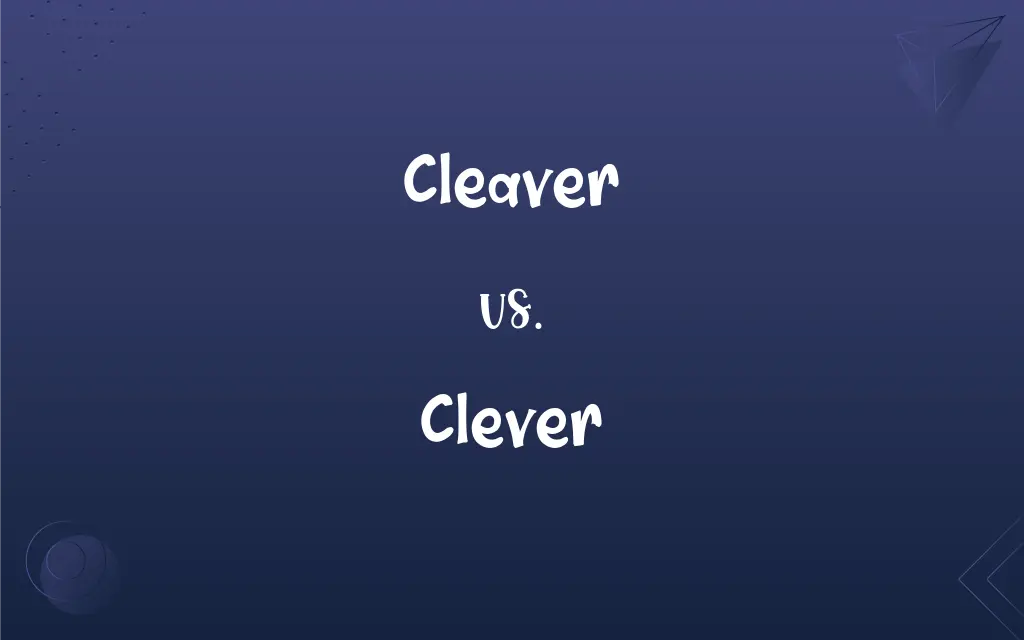Cleaver vs. Clever: What's the Difference?
Edited by Aimie Carlson || By Harlon Moss || Updated on July 8, 2024
Cleaver refers to a large, heavy knife used for cutting meat. Clever refers to showing intelligence or skill.

Key Differences
"Cleaver" is a large, broad knife used for cutting meat, while "clever" is an adjective that describes someone who is intelligent, resourceful, or witty. In the kitchen, a cleaver is essential for breaking down large cuts of meat, while a clever cook can create delicious meals with limited ingredients. Both the cleaver and the clever cook are valuable assets in any kitchen.
A cleaver can also be used as a tool in various crafts and hobbies, while being clever is an important quality for problem-solving and creativity. The sharp edge of a cleaver can make precise cuts, while a clever approach can lead to innovative solutions. Both the cleaver and cleverness are important in the creative process.
In a broader sense, a cleaver can be a symbol of power and strength, while being clever is often associated with wit and intelligence. The weight and heft of a cleaver can make it an imposing tool, while a clever person can use their intellect to influence and persuade. Both the cleaver and cleverness can be used to achieve one's goals.
The importance of a cleaver in culinary arts cannot be understated, as it is an essential tool for any chef. Similarly, being clever is an important quality in many aspects of life, as it allows individuals to think critically and solve problems effectively. Whether in the kitchen or in life, the cleaver and cleverness are both valuable assets that can help individuals succeed.
Comparison Chart
Definition
A large, heavy knife for cutting
Showing intelligence or skill
ADVERTISEMENT
Usage
Primarily in food preparation
Describing mental acuity or skill
Context
Kitchen, culinary settings
Various, including academic, social
Nature
Physical object
Descriptive adjective
Application Scope
Specific, mostly in butchery
Broad, applicable in many scenarios
Cleaver and Clever Definitions
Cleaver
A kitchen tool for chopping meat.
She used a cleaver to cut the chicken.
ADVERTISEMENT
Clever
Showing inventiveness or originality.
The clever design won the competition.
Cleaver
A heavy knife for butchery.
The butcher wielded the cleaver expertly.
Clever
Intellectually quick or resourceful.
Her clever answer impressed the teacher.
Cleaver
A broad-bladed knife.
The cleaver’s blade was sharp and effective.
Clever
Skilled in adapting means to ends.
He was clever at solving puzzles.
Cleaver
An implement for cutting through bone.
He used a cleaver to divide the joint.
Clever
Apt at learning or understanding.
The clever student mastered the topic quickly.
Cleaver
A large knife for culinary use.
The chef’s cleaver was an essential tool.
Clever
Possessing mental agility.
Her clever strategy outwitted the opponent.
Cleaver
A heavy, broad-bladed knife or hatchet used especially by butchers.
Clever
Mentally quick and original; bright
A clever student.
Cleaver
(Archaeology) A bifacial core tool flaked to produce a straight sharp edge at one end.
Clever
Skilled at accomplishing things, especially with the hands
A clever carpenter.
Cleaver
A squarish, heavy knife used by butchers for hacking through bones, etc.
Cleaver
A type of clave, or rhythm stick, a concussive musical instrument used in traditional Bahamian music.
Cleaver
(metaphoric) The act of eliminating someone or something, especially when done by someone with a history of other eliminations; a dismissal, rejection, or removal.
Cleaver
One who cleaves, or that which cleaves; especially, a butcher's instrument for cutting animal bodies into joints or pieces.
Cleaver
A butcher's knife having a large square blade
FAQs
Are cleavers used in all types of cuisines?
Cleavers are common in many cuisines, especially where meat is a staple.
Is a cleaver only used for meat?
Primarily, but it can also be used for other tough food items.
Is being clever always positive?
Mostly, but sometimes it implies cunning in a negative sense.
Are there different types of cleavers?
Yes, including heavier ones for bones and lighter ones for vegetables.
Do cleavers come in different sizes?
Yes, cleavers vary in size based on intended use.
Can a cleaver be dangerous?
Yes, due to its sharpness and weight, proper handling is essential.
Does clever have synonyms?
Yes, words like smart, intelligent, and ingenious are similar.
Does clever always imply academic intelligence?
No, it can also refer to practical intelligence or wit.
Can clever be used to describe animals?
Yes, animals showing intelligence or resourcefulness can be called clever.
Is a cleaver used in vegetarian cooking?
Yes, it can be used for tough vegetables or large fruits.
Can clever be used in a professional context?
Absolutely, especially to describe innovative or efficient work.
How should a cleaver be maintained?
Regular sharpening and proper cleaning are important.
Can someone be too clever?
In some contexts, being overly clever might be perceived negatively.
Is clever a compliment?
Generally, yes, it’s seen as a positive attribute.
Can a cleaver be used for carving?
It’s not ideal for carving; carving knives are more suitable.
Is cleverness innate or learned?
It can be both; some are naturally clever, others develop it.
Are cleavers expensive?
Prices vary; professional-grade cleavers tend to be more expensive.
Do chefs prefer specific cleavers?
Many chefs have personal preferences based on their cooking style.
Is being clever valuable in all careers?
While it’s generally valuable, the importance varies by career field.
Can clever refer to physical skill?
Yes, it can refer to physical skill, not just mental ability.
About Author
Written by
Harlon MossHarlon is a seasoned quality moderator and accomplished content writer for Difference Wiki. An alumnus of the prestigious University of California, he earned his degree in Computer Science. Leveraging his academic background, Harlon brings a meticulous and informed perspective to his work, ensuring content accuracy and excellence.
Edited by
Aimie CarlsonAimie Carlson, holding a master's degree in English literature, is a fervent English language enthusiast. She lends her writing talents to Difference Wiki, a prominent website that specializes in comparisons, offering readers insightful analyses that both captivate and inform.































































